“What are your Interests?” and “What are your hobbies?” are among the most common questions asked during the SSB Interview. What poses a problem then is a big confusion on the part of the candidate. Hobbies and interests are words that would seem like synonyms or at least interchangeable to most of us. For most people, hobbies and interests are the same, and they talk about them in the same breath. However, there are differences between a hobby and an interest that will be talked about in this article.
What are Hobbies?
Hobbies are activities you enjoy doing in your spare time. These can be things you do for fun like drawing or gardening. Hobbies require an active pursuit of an interest that could involve collecting, building, cataloging, or creating something. Your hobby might be writing poems, or it could be collecting pictures of historical buildings. A hobby is, at the same time, an activity that is pleasurable and people take part in such an activity, in their spare time. For example, some people like to take part in some adventurous outdoor activity whenever they get some leisure time. A hobby makes people happy as they are able to forget tensions of their lives for some time. Many people listen to music in their leisure time and are lost in their musical world forgetting all about their worries and problems for the time being.
Remember that a hobby is pursued for fun or pleasure and not for remuneration. Thus, an activity ceases to be a hobby as soon as it becomes a profession or a source of livelihood for an individual.
What are Interests?
Interest is a broad term including hobbies but not all the interests are hobbies. Interests refer to things or activities about what you are curious or concerned. If a subject arouses the interest or curiosity of a person, it is said that his interests lie in that subject. When talking about a man, we often say he has interests in share markets or in sports, whichever may be the case. You may be interested a lot in football but still do not play it on the ground actively. This means you read a lot about football and also watch it on TV and stadiums as you are interested in the sport. Similarly, you are not yourself a politician, but you are interested in politics and watch political news and current affairs programs on TV avidly.
Hobbies vs Interests
- A hobby is an activity that a person regularly does in his leisure time for pleasure whereas interest is an urge to want to learn more about something or to be involved in something.
- A hobby is an activity that one pursues for pleasure and fun. On the other hand, interest is a broader area than this.
- A hobby is an activity done in one’s free time for enjoyment while interest is a desire to learn more about something or to be involved in something, not only in spare time but in working hours too.
- Hobbies may be driven by interest, but interest may not necessarily lead to a hobby.
- Hobby remains for fun and recreation, and an activity ceases to be hobby when it becomes a profession for someone.
- A person’s interests can be a source of income or can be something that he just does without compensation. If a person is interested in cooking and likes to create dishes, he can either cook just for himself or his family, or he can make it a source of income. Hobbies like stamp and game card collecting cannot be a source of income for a person, but there are times that the things collected can be sold.
Now, study the chart below to understand the differences between hobbies and interests more clearly.
| HOBBIES | INTERESTS |
| something that a person does for relaxation and enjoyment and that is actively pursued | something that a person is curious or concerned about and wish to know or learn |
| Active Pursuit | |
| Pursued actively | Not actively pursued |
| Interdependence | |
| Driven by an interest | Not necessarily lead to a hobby |
| Reason | |
| Pleasure and relaxation | Curiosity and concern |
| Monetary Rewards | |
| Do not have | May have |
| Done in | |
| Free and spare time only | Free time or while working too |
Some Examples of Hobbies
- Artistic activities such as painting or graphic design
- Community service
- Cooking or baking
- Examples of interests
- Exercising and healthcare
- Outdoor activities like trekking and mountain climbing.
- Playing an instrument
- Performing arts like singing, dancing
- Creative hobbies such as photography or making jewellery and artistic projects
- Cooking
- Gardening, which can be indoor, water, or container gardening
- Reading books, magazines, or comics
- Team or individual sports
- Travel
- Woodworking or other projects
- Writing or blogging
- Games, which are recreational activities that involve mental and physical stimulation.
Some Examples of Interests
- Making or listening to music
- Gaming
- Travel
- Art
- Nature
- Social causes
- Foreign languages
- Topical blogs or research
- History
- Theater
- Poetry
- Watching games or seasons
- Singing
- Cooking
Do’s & Don’ts
Hobbies and interests that show positive traits or skills, such as dedication and teamwork, will have a more positive impact. Therefore, do not include
- Hobbies or interests with little to no interactivity
- Hobbies or interests that could be considered violent or dangerous
- Hobbies that reflect antisocial behavior or activities
- Hobbies or interests listed as a joke that could be misinterpreted
- Hobbies or interests that reveal personal information you may not want to share with the interviewer/s, such as political or religious affiliations
Do try to choose a variety of activities. This will show that show that you are flexible enough to be comfortable in a lot of different situations and that you are relatable to a range of different people. Also, be honest. Stay away from using examples of hobbies for a resume that aren’t true to you. It is one thing to be unique, but be careful not to cross the line, which may turn out to be something weird and unwanted.
Always remember to include a few or all of the following hobbies to prove your uniqueness and individuality:
- Sports – Individual and Team
- This could include anything from marathon running and yoga to basketball and football. They highlight your ability to cooperate with others and lead.
Individual sports may imply that teamwork isn’t your strong suit. Try to focus on the perseverance and drive that it takes to do something like marathon running. It is best to avoid extreme sports because they are risky.
Examples : Basketball, Baseball, Football, Yoga, Marathon Running, etc.
- Thought Hobbies
Hobbies like chess or playing a musical instrument display analytical and creative skills.
Examples : Chess, Playing the violin, Reading, Writing, etc.
- Collecting
It doesn’t matter if you collect stamps, coins, or rocks. The management of collections shows strong attention to detail and a passion for your personal interests. Just remember – no cats.
Examples : Stamps, Coins, Rocks, Action Figures, Rare Books, etc.
- Social Hobbies – Volunteering or Mentoring
Social hobbies show that you work well with other people and are altruistic.
Volunteering, mentoring, and participating in a club all sound good in the SSB Interview.
Examples : Volunteering at a Local Blood Donation Camp, at NGOs, Orphanages, Old age homes, Cancer hospitals, etc.
So, I hope, now that you are clear about what you should include in your lists of hobbies and interests, when the questions are asked in the SSB Interview, you can start preparing and choosing your answer very carefully. Follow the tips and be careful of the differences, and you can surely be able to stand out in the crowd and impress your interviewer in the SSB Interview. Remember not to get carried away in an attempt to become too unique and special. Remember to keep faith on you and be honest to yourself.
Jai Hind!!


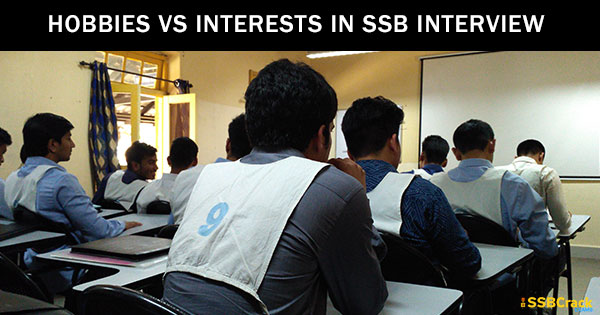

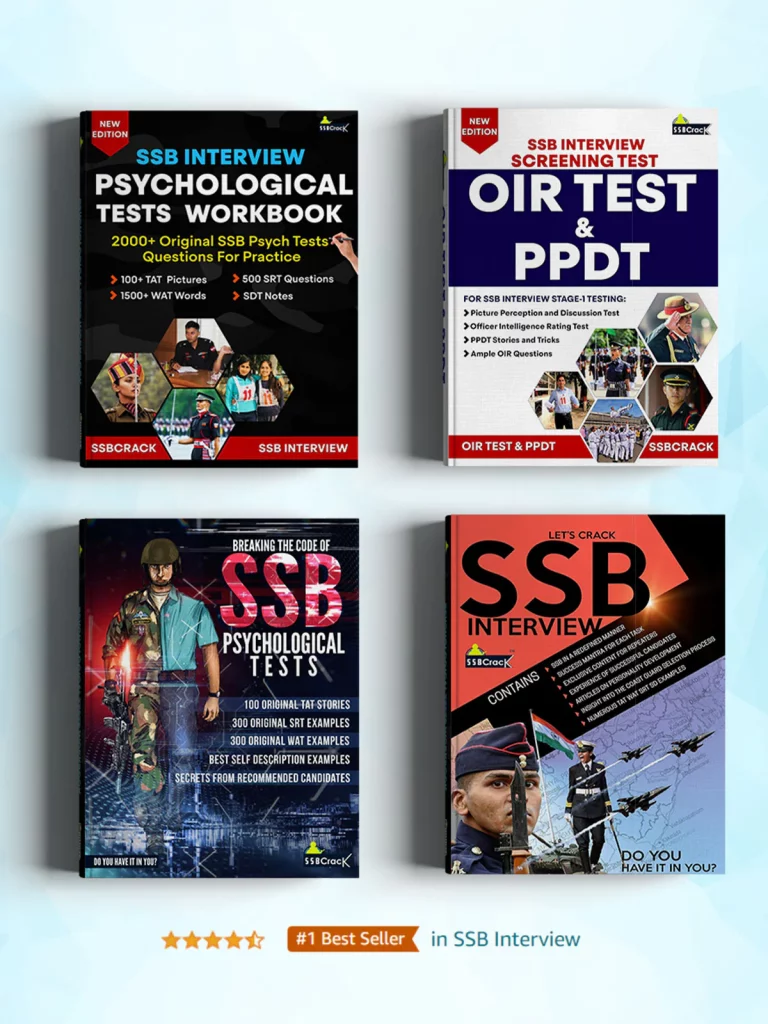




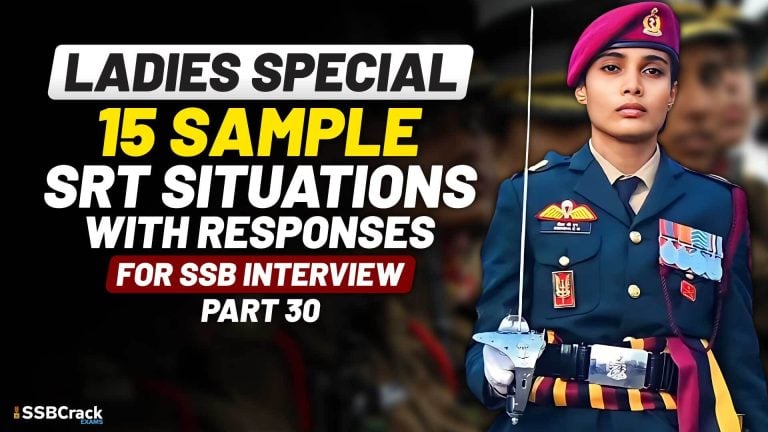
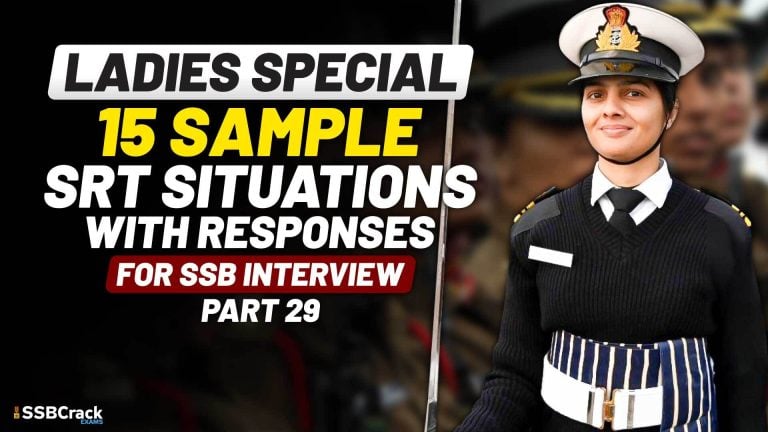
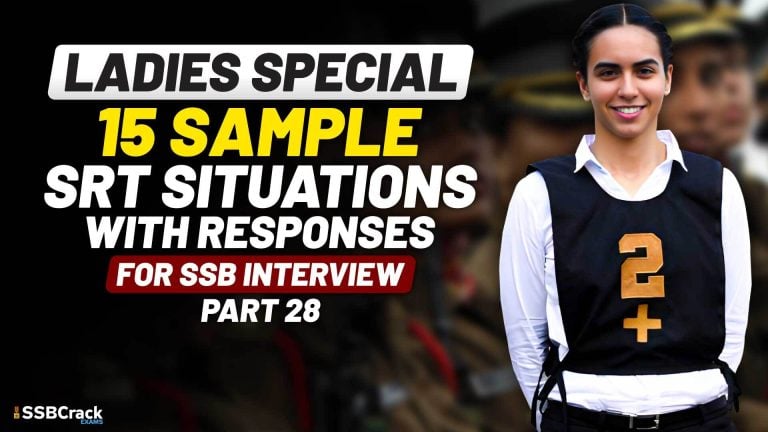




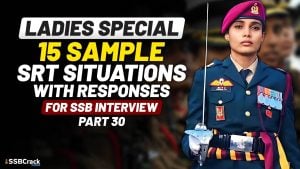






1 thought on “Hobbies vs Interests in the SSB Interview”
Request in weaknesses vs area of improvement